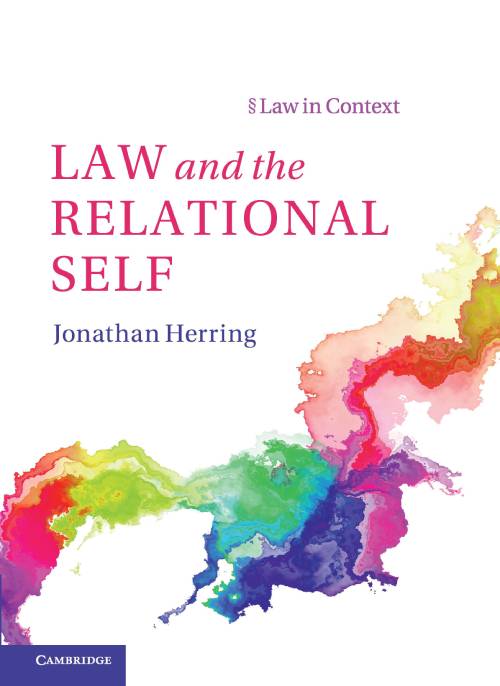
Can the law help us to relate to each other better?
Professor Jonathan Herring’s new book, Law and the Relational Self, imagines how we could create laws that foster caring relationships, instead of breaking them apart.
Professor Herring is not your average law professor. His background is typical: studied Law at Hertford College, trained as a solicitor, did his BCL, then later went into education. But it’s not every solicitor or professor who ends up specialising in relationships.
He wrote a book called How to Argue, which was featured in newspapers as a guide to navigating those tricky conflicts in relationships. Late last year he hit the papers again, referenced as an argument expert in pieces about discussing Brexit and how to avoid doing the same at Christmas.

(He also gave a very entertaining talk on Can Law Be Fun, which is worth your time once you’ve finished reading this.)
He’s also written some more classic law texts, including Criminal Law: Texts, Cases and Materials and Family Law.
His most recent book almost seems to mix these two areas, looking at how law could move from protecting individual rights, to protecting and nurturing relationships.
Perhaps the first thing to consider when we look at this new book is what exactly is meant by ‘relational self’. Professor Herring elaborates: ‘The standard view of the self is individual. Our bodies, beliefs, jobs and possessions define who we are. The relational understanding instead argues that our identities emerge from our relationships.’
It’s a bit like the old John Donne quote “No man is an island”. We’re all part of a larger whole, and the things that make us us are the things or people that we care about. If we try to define ourselves separate to that, then we come up short.
He continues: ‘If you are ask a person to describe themselves, then they are likely to use relational terms: they are someone's sister; they belong to this religious group; or they support this football team. The things that give our life meaning are not things that are unique to us, but our relationships.’
Well, what does this mean for the law? Professor Herring explains that the standard model of law is currently about individual rights: ‘For many lawyers, the most important legal rights are those of autonomy, bodily integrity and privacy. But these rights are about keeping people away from you. They are about preserving the individual as separate from others.’
The law, as it stands, protects independence. It sees your rights as something to be protected from other people. You use the law to look after your interests, perhaps at the expense of others. Law and the Relational Self argues for a version of the law that looks at what’s best for people together.
‘A good law will be one that promotes caring relationships between people.’ He explains. ‘So a successful society, I argue, is not one where people are left free to pursue their own goals as "billiard balls in suits". Rather, it’s one where there are flourishing caring relationships.’

He cites law relating to children as a good example of this. The law currently enshrines the welfare of the child alone as the criteria by which judges should make decisions. This sounds sensible enough until you think about the relationships at play. If what seems best for a child isn’t best for their relationship with their caregiver, it actually isn’t going to be very good for the child after all.
We imagine we can think about the interests of children as separate from their parents, but that is a fiction … It would be better to ask what order will promote good caring relationships between the child and their carers.’
Or we can look at contract law. Effectively, it sets up an “us vs them”, with little obligation to consider what is fair for ‘them’. Whereas Jonathan argues that ‘a contract law designed to promote caring relationship would put obligations on contracting parties to look out for each other.’
A lot of the ideas in the book are informed by his previous work, but it was becoming a parent that crystalised all those ideas into the concept for Law and the Relational Self. Not, as you might expect, because of how a child requires care of its relationships to thrive (that one was a given). Instead, what struck him was how much emotional support children give to their parents.
He describes the experience, saying: ‘Parenthood vividly showed me how false vision the ideal of the "autonomous self-determining free man" is. That seems to be the dream that the law seeks to preserve, but to me it now looks like a nightmare. All the things in my life that give me joy are things that undermine my autonomy. But those are all good things. And I think is true for most people.’
This vulnerability is at the core of the book. We define ourselves by our relationships, and our relationships make us vulnerable, so it follows that…
‘Being vulnerable is an essential characteristic of being human. We might think that as adults we are able to "look after ourselves", but we rely on farmers and shops for food. We rely on friends for meaning and our mental health. We need a whole array of people, from doctors to sewerage workers, to maintain our wellbeing.
‘The strange thing is that society often presents it as a bad thing to be vulnerable and to need care. Carers are some of the most undervalued workers in our economy, when they should be celebrated.’
Professor Herring also highlights how that vulnerability means we sometimes need support from the law when something goes wrong: ‘The importance of care also shows how harmful abuse within an intimate relationship is. If intimate relationships define who we are and, indeed, are key to our survival, then abuse with in them is a "crime against the soul." One of the great strengths of relational theories is that it can highlight the particular evils of domestic abuse.’
A lot of what he says about the book seems to be a question of how the law reflects what we value. To change the focus of the law, would thus give us better building blocks to support a society of caring relationships.
What would such a legal system look like and what would it say about our values? Professor Herring says: ‘At the moment, whether one listens to debates about the impact of Brexit or the arguments among politicians, it would be thought that economic productivity is the mark of a successful society.
‘But what if our schooling, our labour market, our health care system, our political decisions were shaped around asking ‘what will promote good caring relationships?’ This would have huge ramifications for employment practices, tax systems, benefits payments. Being a carer would be an accepted part of being a citizen. The legal and political system would be built around that as a norm rather than, as it is at the moment, being seen as a problem if a worker is a carer.’
In the end, Law and the Relational Self is a book about what we decide important and how we reinforce that. It should be a great read for anyone with in interest in law and how it shapes us.
Jonathan sums it up by saying: ‘We know that making money is not what is important in life. We know our lives are not just "ours" to live as we like, but are made up of responsibilities which constrain our freedom, but that we choose because they are of huge importance and value. We know that what is important is our interactions with others, the smile, the touch, the kiss, the giggle together. That is what matters, not the high sounds principles of autonomy and freedom which dominate the law.’